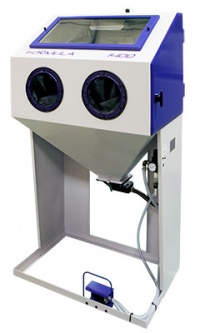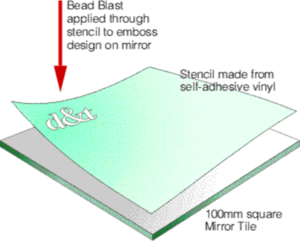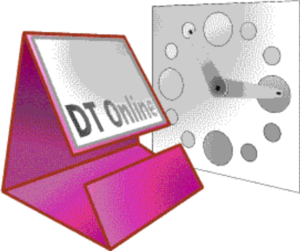Sandblasting: Difference between revisions
From DT Online
mNo edit summary |
Added mirror tile ideas |
||
| Line 19: | Line 19: | ||
</span> | </span> | ||
---- | ---- | ||
[[File:SandblastTileStencil.png|300px|right]] | |||
Stencils can be cut from self-adhesive vinyl to control where the grit will abrade the surface by masking off areas which need to be preserved. Different types of grit can produce effects on different materials. Stencils can be be cut by hand using a '''[[Craft Knife]]''', '''[[Safety Ruler]]''' and '''[[Cutting Mat]]''' accurately produced using a '''[[CNC vinyl cutter]]'''. | |||
[[File:SandblastTileProjects.png|300px|right]] | |||
A 100mm mirror tile, for example, provides a suitable surface to receive an ''etched'' design. The decorated tile can be used as a feature of several projects including: clocks, box lids, and make-up mirrors. | |||
The vinyl stencil is stuck on to the surface of the mirror and abrasive grit is air blasted on to it. Designs which are cut into the stencil are transferred on to the surface of the mirror. Good detail can be achieved but very complicated stencils are difficult to handle quickly. | |||
[[Category:Tools and Equipment]] | [[Category:Tools and Equipment]] | ||
[[Category:Skills and Processes]] | [[Category:Skills and Processes]] | ||
Revision as of 11:19, 6 June 2015

Sandblasting, (AKA Grit Blasting or Bead Blasting) is the process of using compressed air to fire hard particles against objects with aim of cleaning, polishing or roughening the surfaces.
Many local garages will have a small blasting cabinet which they use to clean small vehicle parts.
Safety Point!
Sandblasting is an extremely hazardous process and, in the context of DT Online projects, should be considered only using a purpose-made sealed blast cabinet which is ventilated to the outside atmosphere.
Glass can have designs etched into the surface by blasting with Silicon Carbide and Acrylic with crushed Walnut Shells - Wood can also be blasted with shells to create an attractive raised grain effect.
Safety Point! Under no circumstances should Silica Sand (i.e. beach sand) be used as a blasting medium since exposure to this dust can cause the serious lung disease of Silicosis.

Stencils can be cut from self-adhesive vinyl to control where the grit will abrade the surface by masking off areas which need to be preserved. Different types of grit can produce effects on different materials. Stencils can be be cut by hand using a Craft Knife, Safety Ruler and Cutting Mat accurately produced using a CNC vinyl cutter.

A 100mm mirror tile, for example, provides a suitable surface to receive an etched design. The decorated tile can be used as a feature of several projects including: clocks, box lids, and make-up mirrors.
The vinyl stencil is stuck on to the surface of the mirror and abrasive grit is air blasted on to it. Designs which are cut into the stencil are transferred on to the surface of the mirror. Good detail can be achieved but very complicated stencils are difficult to handle quickly.